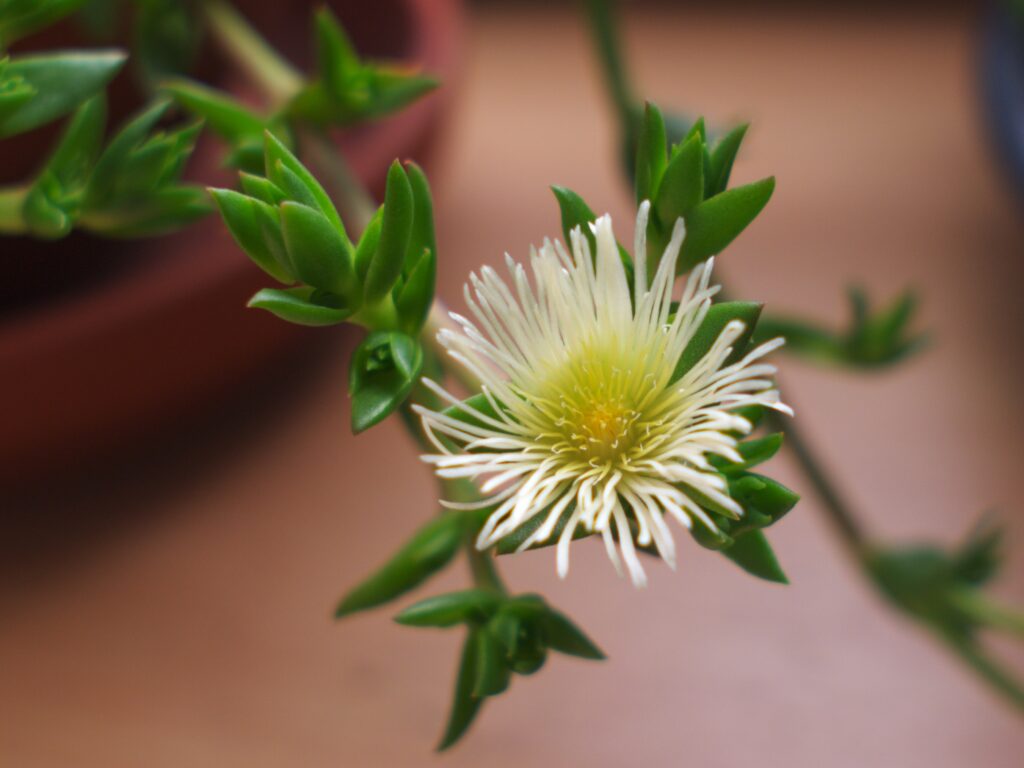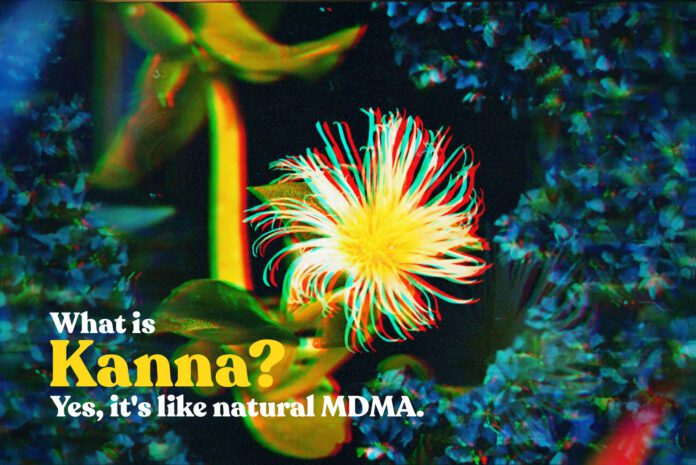Kanna, or sceletium tortuosum as it’s scientifically known, isn’t a newcomer on the scene. It’s been a staple in South African culture for centuries. Traditionally, South Africans have chewed, smoked, snuffed, or brewed the succulent’s flowers into tea. Interestingly, as James Giordano, a professor at Georgetown University Medical Center, pointed out, some Europeans have even turned to kanna to ease separation anxiety in pets.
Giordano attributes kanna’s psychotropic effects to two psychoactive alkaloids, mesembrine and tortuosamine, noting that doses as low as 5 to 10 mg can begin to elicit mild effects. Similar to MDMA, kanna offers mood-lifting and anti-anxiety benefits. “You’re going to feel euphoric, really happy, loving, and chill,” he explained, adding that some users report enhanced clarity of thought.
Peter Barsoom, CEO of 1906, which markets cannabis edibles, observed that their BLISS edible, containing 20 mg of kanna, has been praised for reducing social anxiety and fostering sociability. Barsoom’s personal experience with kanna left him feeling overwhelmingly positive about the world.
The sexual dynamics of kanna, as Giordano pointed out, parallel those of MDMA, with reports of heightened pleasure for some, while others experience drawbacks in performance. Ways likened sex on kanna to an “incredibly intense and relaxing” experience, akin to “HD mode.”

What is Kanna?
Kanna has a rich history of use among the Khoisan people of South Africa, who valued it for its mood-enhancing properties. In contemporary times, it is available in various forms, including extracts, teas, and supplements, making it accessible for those seeking its calming effects.
Used for centuries by the San and Khoikhoi people of South Africa, Kanna has been chewed, brewed into teas, or smoked for its purported benefits. These include easing anxiety, quenching thirst, combating fatigue, and serving spiritual purposes. Despite its long history, Kanna has only recently begun to attract global attention for its potential health benefits.
Despite its growing fame in North America, kanna remains legal in the U.S., with the caveat that distribution must comply with FDA standards.
Amidst the growing intrigue for natural psychoactives in North America, Shayana Shop introduces Europe to the Kanna Extract ET2, a high-potency beacon for enthusiasts well-versed in the ancient South African herb’s calming and mood-lifting saga. This most concentrated form of Sceletium Tortuosum, known for delivering rapid, euphoric effects especially when used as snuff, offers a unique blend of mood enhancement, stress relief, and enhanced focus. With a recommendation for beginners to start at doses of 15-20mg and the more experienced to explore up to 40-50mg, the ET2 extract promises a nuanced journey into relaxation and mental clarity, encapsulated in a 1 gram package of potent botanical extract.

JC Ways, a 26-year-old sex educator from Manchester, shared his experience with kanna, which he snorted from a smartshop in Amsterdam. He described feeling “quite smiley and euphoric,” a sensation coupled with an energetic yet relaxed state.
The Benefits of Kanna
Kanna is celebrated for its ability to naturally boost mood and reduce anxiety without the harmful side effects associated with synthetic drugs. It works by enhancing serotonin reuptake in the brain, which can lead to improved cognitive function and a sense of well-being. Mental health professionals have noted its potential in treating anxiety and depression, highlighting its calming and mind-clearing properties.
Given its cognitive and mood-enhancing promise, kanna is under scientific scrutiny, potentially offering benefits for individuals with Alzheimer’s and other forms of cognitive decline, as well as those suffering from anxiety.
May Relieve Anxiety: The primary use of kanna is for anxiety and stress relief, believed to affect the amygdala, the brain’s fear and threat processing center. Research on this is limited, but a 2011 study on rats showed a small positive effect on anxiety levels, though it’s uncertain if these effects translate to humans. A small human study on Zembrin, a kanna-based supplement, indicated reduced anxiety-related amygdala activity, but the study’s small scale calls for further research.
Could Promote Pain Relief: There’s anecdotal evidence that kanna can alleviate physical pain, though scientific support is scarce. A 2014 rat study suggested a potential pain-relieving effect, but its applicability to human pain relief remains unconfirmed.
Might Reduce Stress: Kanna is thought to have sedative properties that could help calm or induce sleepiness in stressed individuals. A 2016 study hinted at kanna extract’s beneficial effects on stress and hypertension levels, yet concluded that more research is needed.
May Combat Depression: Kanna is often touted for its mood-boosting and depression-fighting properties. A rat study observed antidepressant properties in kanna extract, but it also led to significant side effects, including ataxia, cautioning against direct extrapolation to humans.
Might Improve Brain Function: Some believe kanna can enhance cognitive functions such as flexibility, memory, and reaction speed. Research is limited, but a study on rats and a small human trial showed some promise in improving executive function, mood, and sleep.
Kanna as a Safer Party Drug Alternative
The comparison between Kanna and MDMA often arises in discussions about natural alternatives to party drugs. While Kanna does offer mood-brightening effects, it is important to note that its impact is more subtle than the intense high produced by MDMA. This subtlety makes Kanna an appealing option for those looking for a safer, less intense experience.
Despite its MDMA-like effects, kanna operates differently, targeting serotonin transporters to prolong the presence of serotonin in the brain, akin to the action of SSRI antidepressants. Giordano also highlighted kanna’s interaction with cannabinoid receptors and its potential to boost cognition by inhibiting acetylcholine breakdown.
Kanna’s safety profile is generally positive, barring adulteration or extreme overdoses. Mixing kanna with substances like MDMA, SSRIs, MAO inhibitors, or 5HTP, however, raises the risk of serotonin syndrome, a serious condition marked by excessive serotonin activity.
Giordano sees kanna as a promising, lower-risk alternative to MDMA, offering similar euphoric and anxiolytic effects through a distinct biochemical pathway. “For those seeking euphoria, anxiety reduction, and mood stabilization, kanna presents a safe option,” he concluded.
Reddit’s Take:
On platforms like Reddit, discussions around Kanna have highlighted its traditional use in South Africa for centuries, where it has been valued for its calming and mood-lifting effects. Users are curious about its efficacy and safety, comparing it to well-known substances such as MDMA and cocaine but with an interest in the natural aspect and the perceived lower risk profile of Kanna. For instance, in threads like Alternatives to MDMA? on r/aves, users express a desire for drugs that can enhance confidence, energy, and music appreciation without the neurotoxic effects associated with frequent MDMA use.
The conversation in Kanna for Rave/Night Out delves into personal experiences with Kanna as an alternative to harder stimulants for social events. Participants in these discussions often share their own stories of seeking substances that can provide a social boost or enhance a night out without the significant downsides of traditional party drugs. However, there’s also a cautionary tone in discussions like Is Kanna really like ‘Natural’ MDMA, where users debate the safety of natural substances versus synthetic drugs, reminding each other that “natural” does not automatically mean safer.
In threads such as What is the healthiest alternative to alcohol for parties? on r/Drugs, Kanna is mentioned alongside other substances like Kratom and CBD as potential options for those looking to reduce their alcohol consumption. The discussion reflects a broader trend of individuals exploring ways to enjoy social settings and manage anxiety or stress without resorting to traditional alcohol or party drugs.
The Need for Further Research
While Kanna has been used traditionally for centuries, there is a need for more comprehensive research to fully understand its safety, potential health benefits, and long-term effects. This gap in knowledge calls for cautious use, especially in recreational settings.
Conclusion
Kanna offers a promising natural alternative for those seeking to enhance their mood and reduce anxiety without resorting to synthetic drugs. However, its use should be approached with caution, and individuals interested in Kanna should consult healthcare professionals before incorporating it into their wellness routine. As research continues to unfold, the potential of Kanna as a safe and effective herbal remedy remains a topic of interest in the field of natural health and wellness.
